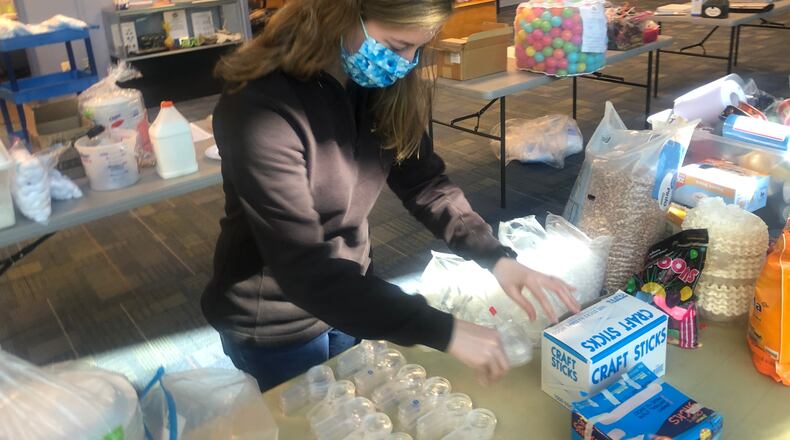Tracey Tomme, the CEO of Dayton Society of Natural History, which includes Boonshoft and the SunWatch Indian Village and Archaeological Park, says the animals have taken note of the changes since the closure brought on by the pandemic put the museum and other cherished Dayton institutions on uncertain grounds.
>> RELATED: ‘It is millions of dollars in ticket sales alone,’ arts leader says of coronavirus impact
“The more shy animals are more active,” she said, adding that the meerkats and otters clearly miss the 180,000 visitors the museum attracts annually. “When you walk through, they are so eager. They are like, ‘Hey hey, hey’.”
Another 20,000 people visit SunWatch each year.
Tomme said she is hopeful the museum can reopen by July 1 to the public.
She is also realistic.
>> Answering key questions about the economic crisis: Have we hit bottom yet? 'Far from it'
“If we are closed through the fall, we are in trouble,” she said.
The Boonshoft closed March 15, around the time Gov. Mike DeWine ordered day care centers and schools closed across the state.
“March would have been our largest month of the year,” she said. “It was barely anything.”
Boonshoft and SunWatch will be closed until at least May 29, messages on their websites say.
That doesn’t mean activity has stopped completely.
Roughly $60,000 in improvements are being made to the museum’s lighting, camera and sound systems to improve educational programs, Tomme said.
On a recent visit to the Boonshoft, staffers deep cleaned exhibits — sometimes with Q-tips — trained and cared for animals, installed equipment for distance learning classes and assembled whimsical kits for the museum’s digital Camp in a Box program.
SUMMER CAMP
Normally, 600 campers would spend time at the museum each year.
With the classes online, there is no limit and there have been registrations from as far away as Colorado and Texas.
About 1,000 Camp in a Box kits have been made for a list of topics that includes backyard astronomy, engineering principles of Ancient Egypt, mad science and potions.
>> Coronavirus: Flip to online classes might have lasting lessons
Officials are hoping for a successful camp program.
The Camp in a Box package is $250 with live interactive instructions from Boonshoft educators, an activity materials kit and written guides. A $200 version is available without the live interactive instructions.
The museum is offering 40 scholarships for the program, with more details and applications available on its website.
UNCERTAIN TIMES
Tomme said the society has not laid off or furloughed any of its 40 full-time or roughly 20 part-time employees.
It has received a Paycheck Protection Program loan, but that does not make up for revenue it has lost.
Eureka: Sip, Savor, Science, a Boonshoft fundrasing party, was canceled. Tomme said the Boonshoft Bash, a gala that nets $100,000 to $150,000 annually, may be as well.
“We are holding our date,” Tomme said. “I don’t see us pushing it back. You can only have so many fundraisers in November or December.”
THE BEST YEAR EVER
>> Dayton cancels annual Lights in Flight Fireworks Festival
Before the pandemic hit, Tomme said the Boonshoft was back on track after more than 10 tough years.
“We were having our best year ever in years,” she said. “We got away from balancing our budget off the endowment. That is incredible for us.”
>> Coronavirus: Will workplaces ever be the same?
At its peak in 2008, the Boonshoft’s endowment sat at $21 million. Then the Great Recession took its toll on Dayton. Today, the endowment has about $10 million.
“It should be around $19 million,” Tomme said.
The museum’s operating budget is $4.5 million.
“It’s a terrible way to run a company, but I can see why (it was done),” she said of using the endowment to support the museum. “Without big corporate dollars propping you up, that just doesn’t work anymore.”
The Boonshoft is located just outside the path of one of the most ferocious of the Memorial Day tornadoes. But aside from a few downed trees and a few days without power and Internet, the Boonshoft survived the storm unscathed.
>> 2 downtown shops close, owners say lack of foot traffic and coronavirus are both factors
Tomme said the Dayton Society of Natural History began a strategic plan in 2019 that saw staff reduction of about 10 people, streamlining, broadening the revenue and outreach, as well as the decision to stop managing Fort Ancient Earthworks and Nature Preserve in Oregonia.
That historic site is now managed by Ohio History Connection.
Tomme said her staff has been thinking outside the box as it moves forward.
“We are still meeting our mission,” she added.
She pointed to the sale of jewelry molded to look like trilobite fossils to other museums and Boonshoft at Home, a free online video series that includes behind-the-scenes tours of the museum, discussions and experiments.
“We just got super laser-focused on what we do,” she said, adding that attracting more people to the museum will only get you so far. “I am trying to find ways we can earn our way out.”
Despite the strain closure has caused, the museum can’t rush to reopen, Tomme said.
“We won’t open until we know it is safe,” she said. “We have small kiddos. We have elders who bring their kiddos.”
About the Author





